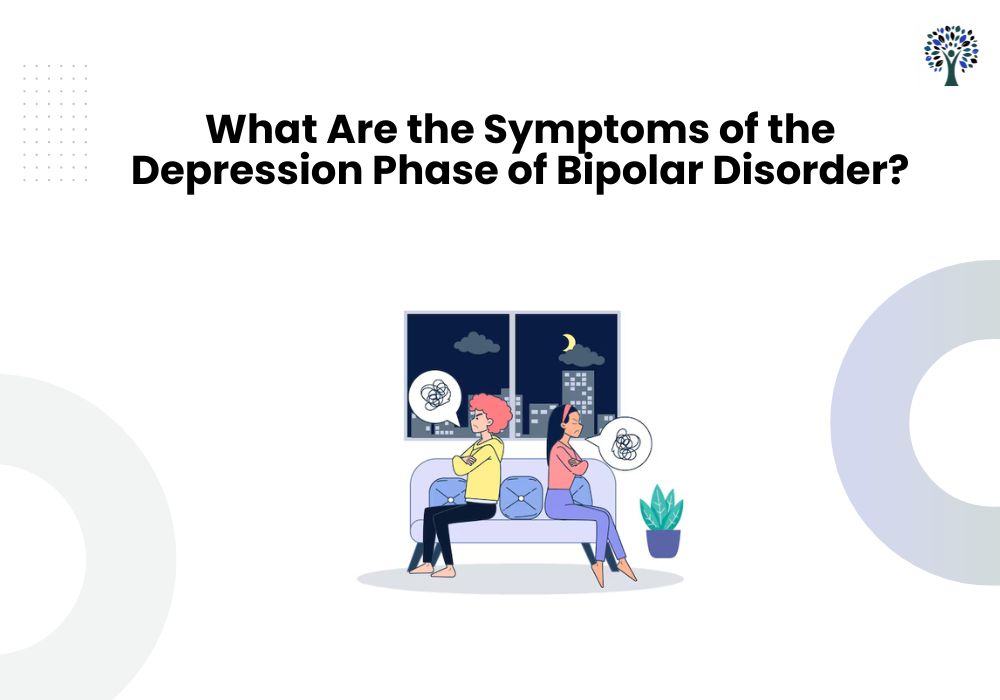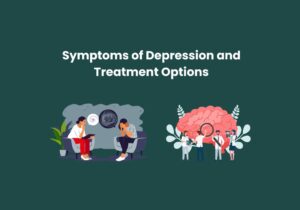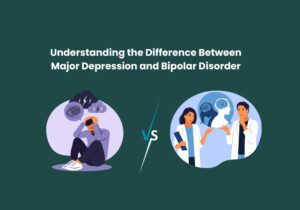Bipolar disorder is a serious mental health condition. It affects millions of people around the world. A key feature of this illness is mood swings. These include manic, hypomanic, and depressive phases.
Many people have heard of mania. This phase comes with high energy and a lifted mood. Others know the sadness and low energy of depression. But the depression phase in bipolar disorder is not always easy to notice. It can also be hard to manage.
Knowing the signs of this phase is essential for better care. It helps both those living with the illness and the people who support them. Getting help early and using the proper treatment can significantly improve life quality.
What is Bipolar Disorder?
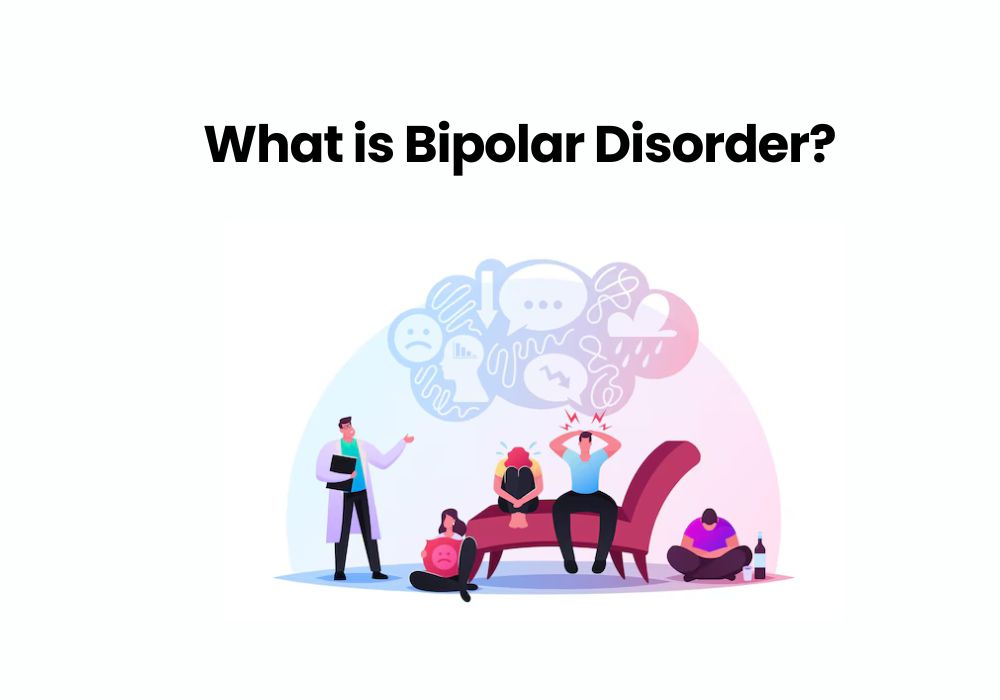
Bipolar disorder is also called manic-depressive illness. It is a mental health condition that causes substantial mood changes. A person may feel very happy and full of energy (this is mania or hypomania), or very sad and tired (this is depression). These shifts can be significant and impact how a person lives their daily life. It may harm their work, relationships, and overall well-being.
The depressive part of bipolar disorder is not the same as normal depression. Both can bring sadness and a low mood. But with bipolar disorder, the sad times come in cycles. There may be high-energy phases in between the sad ones.
When someone feels bipolar depression, they may feel very down. They may feel hopeless, exhausted, and lack motivation to do anything. Learning these signs can help tell it apart from regular depression. This also allows doctors to choose the proper care.
Symptoms of the Depression Phase in Bipolar Disorder
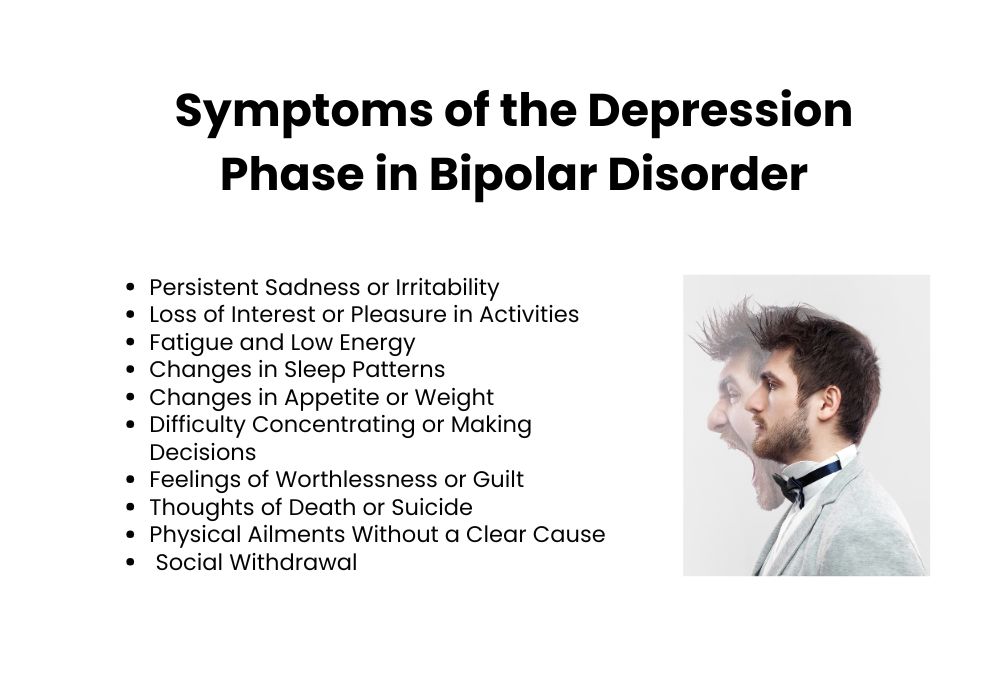
People with bipolar disorder often feel sad and hopeless for a long time. They stop liking things they used to enjoy. These low moods can last for weeks or even months. Some common signs are:
1. Constant Sadness or Irritability
Many people with bipolar depression feel deep sadness all the time. It’s not just a bad day. It’s a heavy, ongoing feeling. Some may feel angry or annoyed, even in calm moments.
2. No Joy in Favorite Activities
Things that once brought joy may now feel boring. Hobbies, talking to friends, or reaching goals may no longer matter. This loss of interest can lead to feelings of isolation and disconnection.
3. Very Low Energy
People often feel tired all the time. Even small tasks can seem too hard. Getting out of bed or brushing teeth may feel like too much. This isn’t just being sleepy, it’s deep, full-body tiredness.
4. Trouble Sleeping
Sleep often changes. Some people sleep too much. Others can’t sleep at all. These sleep problems can exacerbate tiredness and make it more challenging to cope with daily life.
5. Big Changes in Eating or Weight
Some people lose their appetite and lose weight. Others eat more and gain weight. These changes often follow mood and can be different from one episode to the next.
6. Hard Time Focusing or Deciding
It can be hard to think clearly. People may forget things or struggle to make choices. This affects work, school, and home life. Even simple tasks may feel confusing.
7. Feelings of Guilt or Worthlessness
People may feel like they’re not good enough or that everything is their fault. They may often think about past mistakes. These feelings can be excruciating and may lead to thoughts of self-harm.
8. Thinking About Death or Suicide
Some people think about death or wish they weren’t alive. In severe cases, they may try to harm themselves. These thoughts are a medical emergency. Help is needed right away.
9. Unexplained Aches and Pains
Depression doesn’t only affect the mind; it can hurt the body too. People may experience pain, stomach problems, or feel unwell, even if doctors can’t find a clear cause.
10. Pulling Away from Others
People often stop spending time with family or friends. They may stay home and avoid contact. This may happen because they feel tired, sad, or don’t want to bring others down. But this can make the depression worse.
How the Depression Phase of Bipolar Disorder Differs from Unipolar Depression
Bipolar depression and unipolar depression share many symptoms. But one big difference is mood swings. In bipolar disorder, low moods come and go with high moods. These highs are called manic or hypomanic episodes. This back-and-forth change makes bipolar depression different. Knowing this helps doctors give the proper treatment.
People with unipolar depression feel low but do not have these big mood swings. The focus is only on the low mood and its signs.
Bipolar disorder needs a different plan. Doctors often use mood stabilizers or antipsychotic drugs. These help stop both the low and high phases.
Treatment for the Depression Phase of Bipolar Disorder
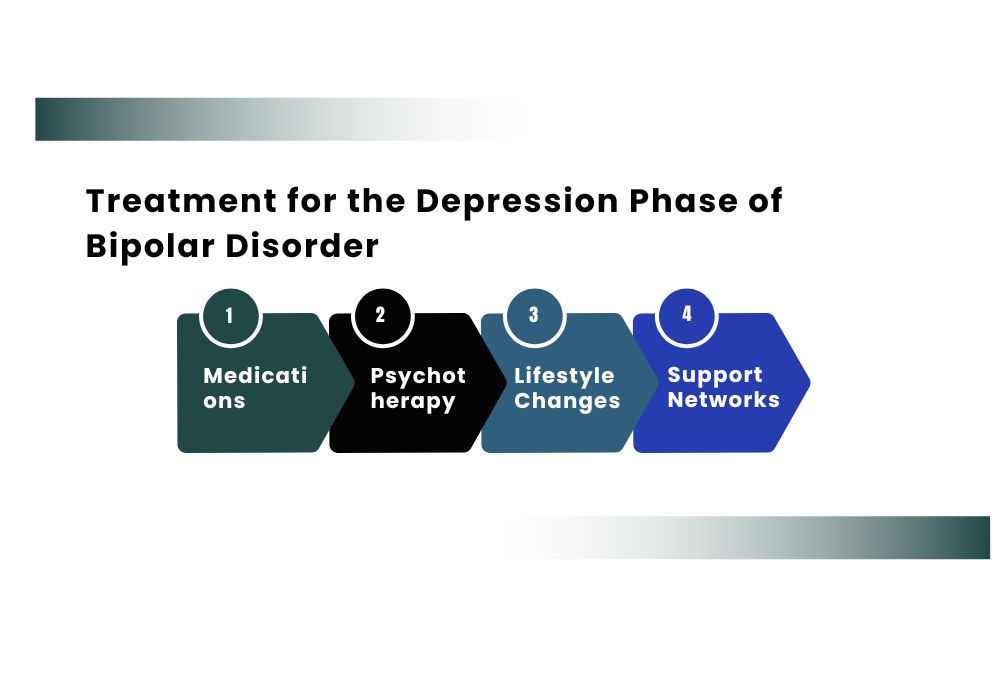
Bipolar depression can be treated. Managing it may take more than one type of care. Most people need a mix of treatments. Here are the common ones for the depression phase:
- Medicines: Doctors often use mood stabilizers, antidepressants (along with mood stabilizers), and antipsychotic drugs. These help balance mood and ease low feelings.
- Talk therapy, including Cognitive Behavioral Therapy (CBT) and other types of counseling, can be helpful. They teach ways to cope, manage feelings, and stop negative thinking.
- Healthy habits: Good sleep, a balanced diet, and regular exercise can make a big difference. Stress control also helps. A steady daily routine adds stability. That’s very important for people with bipolar disorder.
- Support systems: A strong group of family, friends, and care providers is beneficial. Support groups and online chats can also offer advice and care from others who understand.
Here are some common questions people ask
What are the common symptoms of the depression phase in bipolar disorder?
Symptoms include persistent sadness, loss of interest in activities, fatigue, difficulty concentrating, sleep disturbances, and suicidal thoughts.
How long does the depressive phase of bipolar disorder last?
The duration varies but can last from weeks to months, depending on the individual and the effectiveness of the treatment.
Can the depressive phase be treated?
Yes, treatment options include medication, therapy, lifestyle changes, and support groups to help manage symptoms effectively.
Conclusion
The low side of bipolar disorder can be complex and tiring. Many people find it very tough to handle. Finding the signs early helps with quick and good care.
The right mix of medicine, talk therapy, and support can make a significant difference. Even during deep lows, people with bipolar disorder can live whole and happy lives. If you or someone you care about feels like this, talk to a doctor or therapist. This is the first step to feeling better.
At Peniel Psychiatry, we help people manage bipolar disorder and other mental health problems. We use care plans tailored to your needs and backed by scientific evidence. Reach out to us today. We are here to help you feel better and live a better life.

